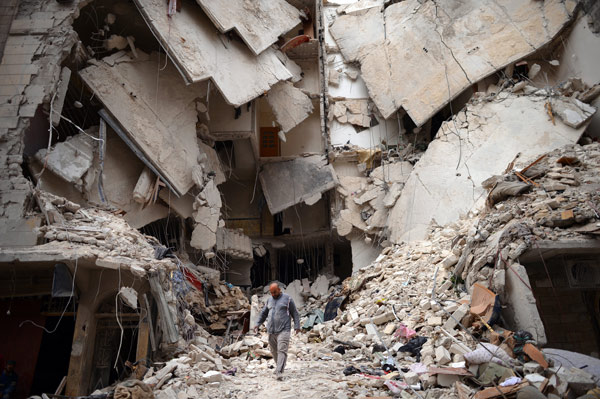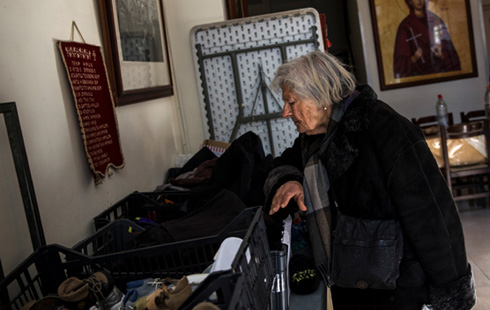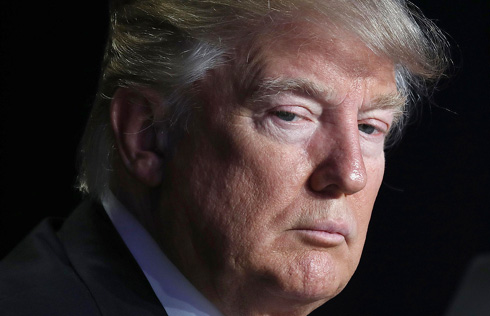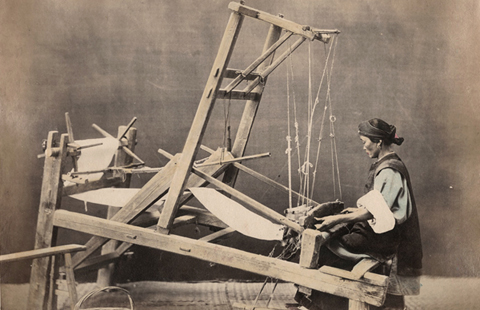UN-Syria talks on chemical weapons at impasse
Discussions between the United Nations and Syrian government on a possible investigation into the alleged use of chemical weapons in Syria have reached an impasse, UN diplomats said on Wednesday.
Syria and the UN have been exchanging letters for weeks, but the two sides are far from agreement on how the investigation should be run, diplomats said on condition of anonymity.
Damascus has asked the UN only to investigate what it said was a rebel chemical attack near Aleppo last month. The opposition has blamed President Bashar al-Assad's forces for that strike and also wants the UN team to look into other alleged chemical attacks by the government.
 |
|
A Syrian man walks amid destruction in the northern Syrian city of Aleppo on Wednesday. US Secretary of State John Kerry met with Syrian opposition leaders in London to discuss ways to step up non-lethal aid to the rebels. Dimitar Dilkoff / Agence France-Presse |
There have been three alleged chemical weapons attacks - the one near Aleppo and another near Damascus, both in March, and one in Homs in December. The rebels and Assad's government blame each other for all of them.
So far, the Syrians are refusing to let inspectors go anywhere but Aleppo, while the UN is insisting that the team goes to both Aleppo and Homs. France and Britain wrote to UN Secretary-General Ban Ki-moon last month saying the mission should look into all three cases.
The Syrian Foreign Ministry restated that position in a news release on Monday, saying the UN request to go anywhere in Syria where chemical weapons may have been used was not in keeping with the Syrian government's original request.
In an April 6 letter from Syrian Foreign Minister Walid al-Moualem to Ban, obtained by Reuters, Assad's government said the inspectors should go first to Aleppo and if they are seen to be impartial, the possibility of visiting Homs could be discussed.
"After the mission completes its work, and ascertaining its honesty and neutrality and the credibility of its work away from politicization, it may be possible to look into the Homs claims," the letter said.
On Wednesday, Syrian troops battled rebels in the outskirts of Damascus.
With the recent influx of better weapons and other foreign aid, the rebels have seized military bases and towns in the strategically important region between Damascus and the border with Jordan, about 160 km from the capital.
Inspectors ready
Moualem offered Syrian planes that would have the UN logo painted on them "to ensure the safety of the (inspection) team members in view of the prevailing security situation".
Western delegations said the Syrian response of April 6 was unacceptable and that the chemical weapons team must have assurances now that it can visit both Aleppo and Homs.
After meeting in The Hague with the head of the Organization for the Prohibition of Chemical Weapons, or OPCW, which is providing scientists and equipment for the inspection team, Ban said an advance team was in Cyprus, ready to go to Syria within 24 hours.
Britain, France and the United States have given Ban information about the possible use of chemical weapons in Aleppo and Homs, UN diplomats said.
"He (Ban Ki-moon) recognized that there is sufficient evidence to investigate both in Homs and in Aleppo," the senior diplomat said.
The UN has two options, diplomats said, if Syria refuses to promise the mission can visit Homs, starting with Ban reporting back to UN member states that the Syrians are not cooperating.
"Or you can continue the investigation but outside Syria in terms of investigating witnesses in the camps," the senior diplomat said. "There may be some physical evidence of people who have been poisoned (who are now) outside Syria."
If it goes ahead, the investigation will try to determine only if chemical weapons were used, not who used them. If it is confirmed that the weapons were used, it would be the first time in the two-year-old Syrian conflict.
Reuters-AP


























